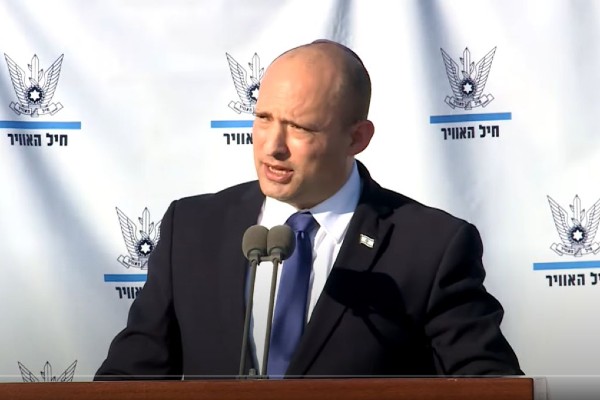“We do not hesitate to act when it is needed,” said Bennett.
By United With Israel Staff
Prime Minister Naftali Bennett hinted at Israeli fingerprints on a mysterious drone attack on an Iranian nuclear facility.
“Our enemies know — not from statements, but from actions — that we are much more determined and much more clever, and that we do not hesitate to act when it is needed,” Bennett said in an address to graduates of the Israeli Air Force’s flight course at the Hatzerim Air Force Base, near Beersheba.
Bennett also referred to Israel’s strike on an Iraqi nuclear reactor in 1981, the first time a nuclear site was ever destroyed in a military attack.
Israeli prime ministers, Bennett insisted, have always had a “sacred responsibility not to allow an existential threat to the State of Israel. Then it was Iraq, today it is Iran.”
He was thought to be alluding to a drone attack on the Karaj centrifuge production facility, near Tehran, on Wednesday.
Iran’s state-controlled media said no damage was caused, while Israeli media reported substantial damage.
Iran has not yet accused Israel of responsibility.
Karaj was reportedly on a list of targets which Israel is said to have shown the Trump administration, according to the New York Times. Karaj, which Iran claims is for peaceful purposes, has been hit by international sanctions.
The drone attack may complicate American efforts to negotiate a return to the JCPOA nuclear agreement, from which Washington withdrew in 2018.
The sixth round of indirect U.S.-Iran talks in Vienna concluded on Sunday, with a new round yet to be scheduled. Returning the U.S. to the nuclear deal is a foreign policy priority for the Biden administration, which believes the agreement can be strengthened through talks. Israel opposes a U.S. return to the agreement.
In the past year, a number of Iranian facilities have experienced mysterious explosions and cyber attacks.
The most high-profile attack was the 2020 assassination of Mohsen Fakhrizadeh, regarded as the “father” of Iran’s nuclear weapons program.
